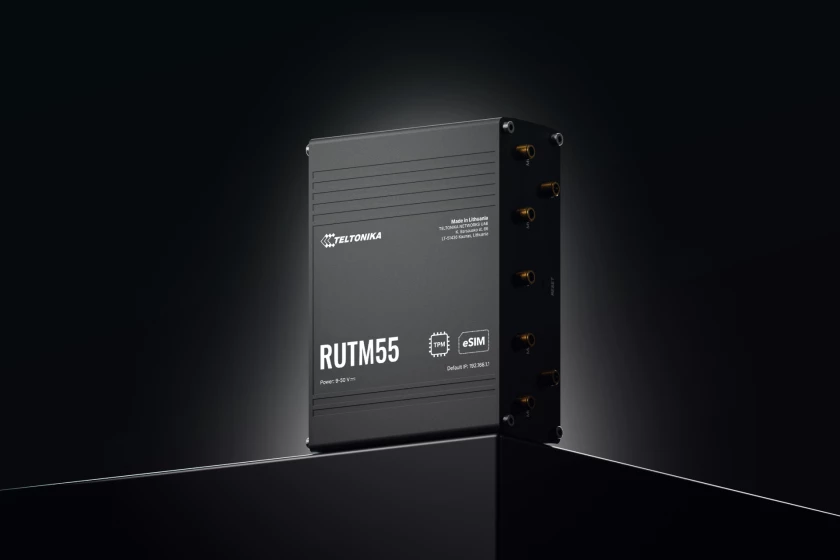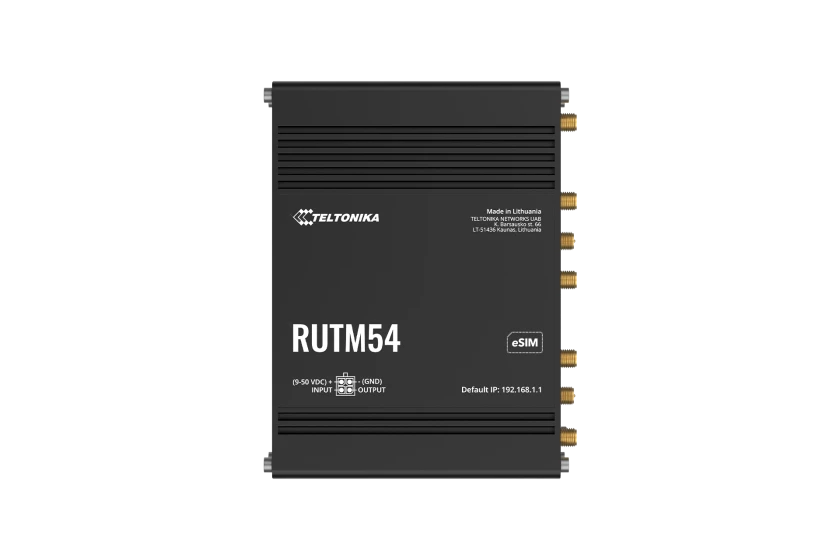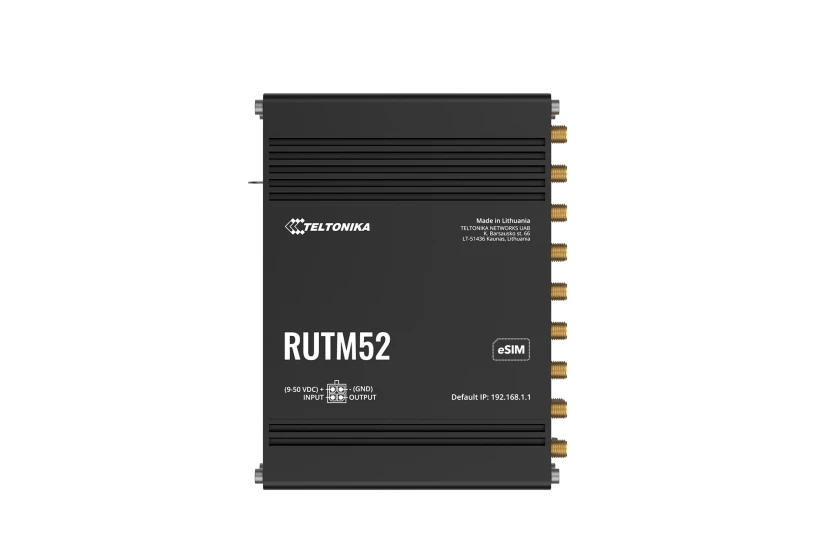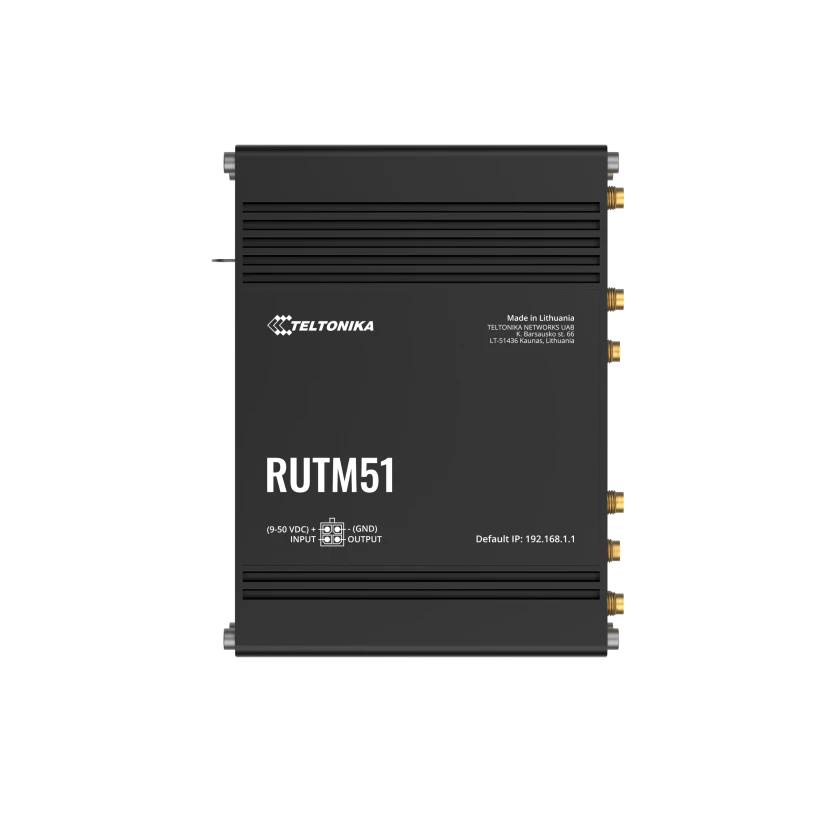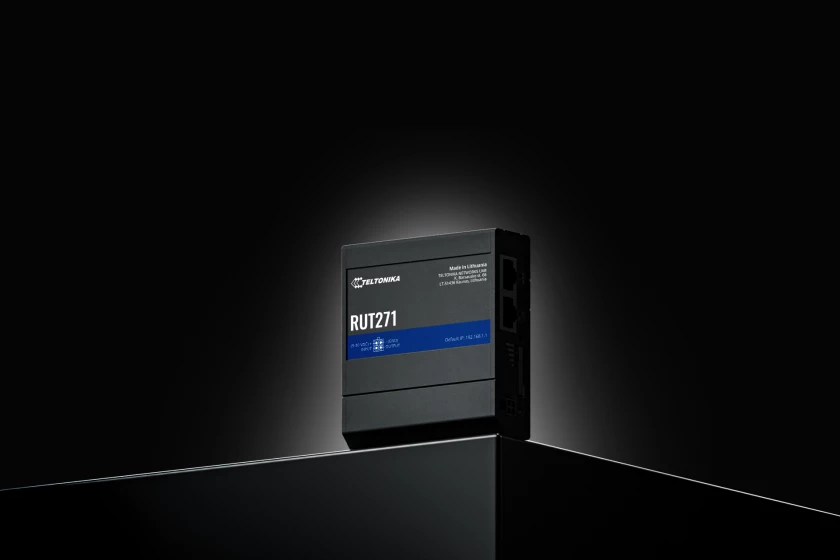


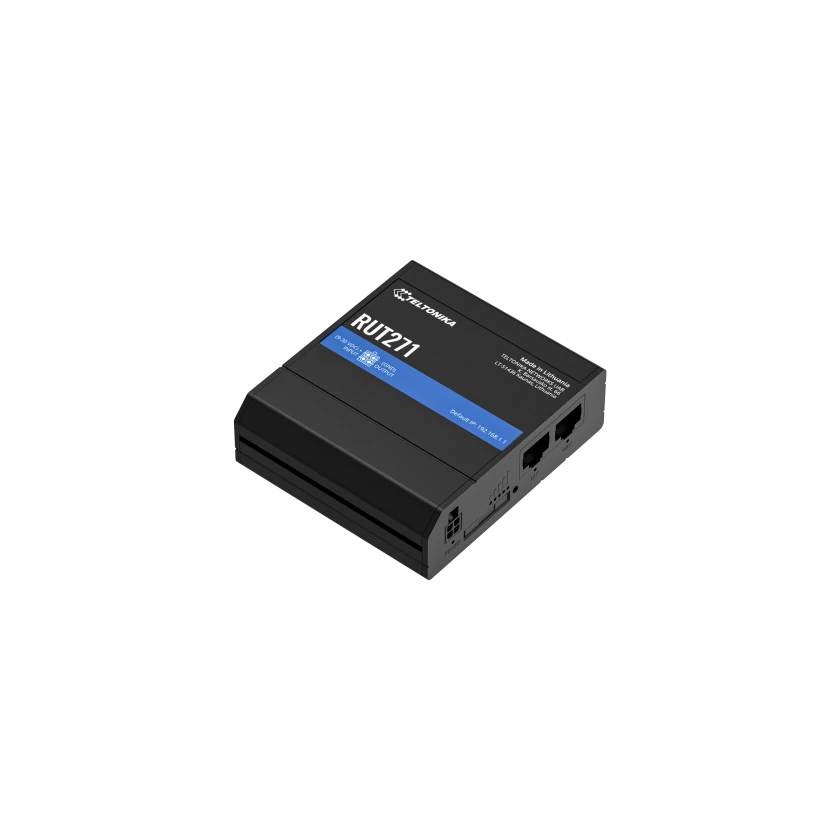
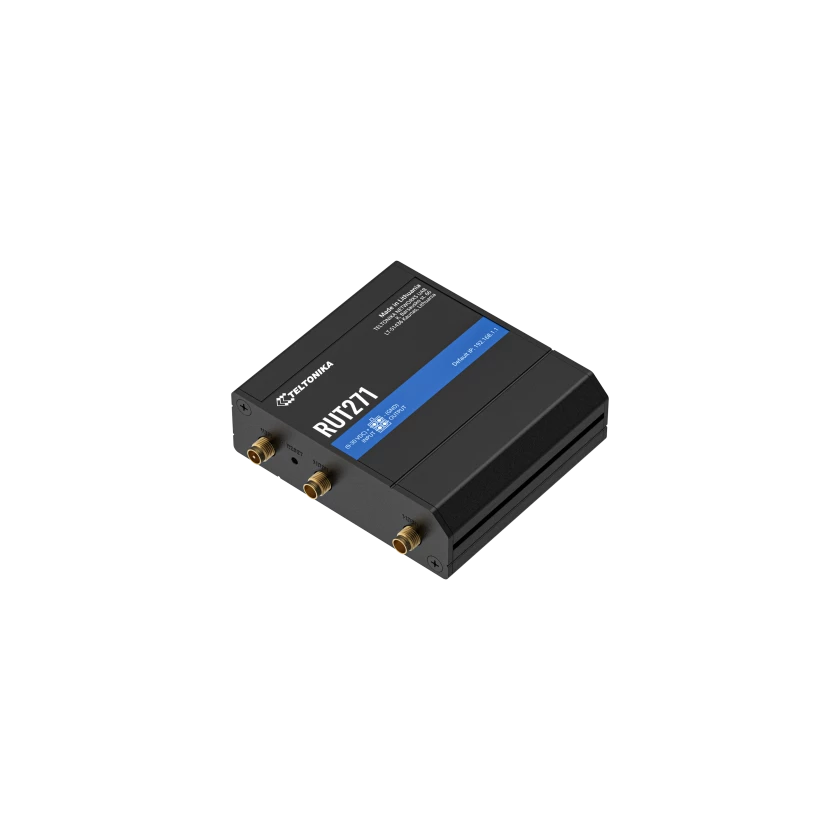


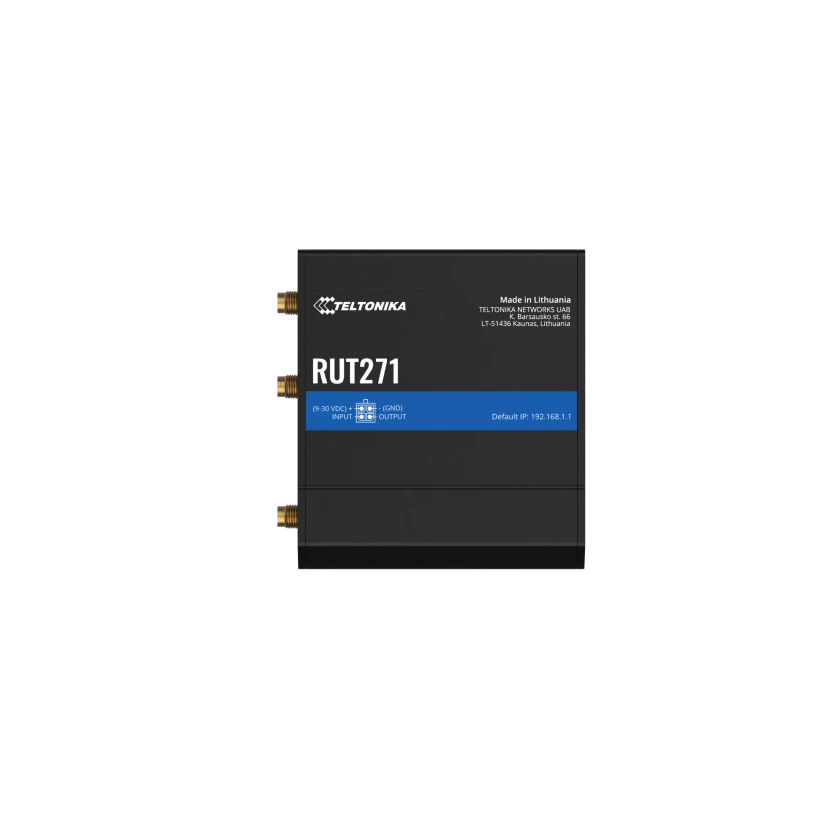
RUT271
The RUT271 is a Redcap 5G router, bridging the gap between 4G and full-capacity 5G. Supporting SA architecture, this 5G router can wirelessly support up to 50 end devices and features the low latency of 5G—at affordable pricing. The RUT271 supports Wi-Fi and is backward compatible with 4G LTE Cat 4. This industrial-grade RedCap 5G router is also equipped with WAN failover, two 10/100 RJ45 ports, a compact and durable design, and numerous other brilliant features for expert professional deployment.
Mobile
Mobile Module
5G Sub-6Ghz SA 223 Mbps DL, 123 Mbps UL; 4G LTE Cat 4 – LTE 195 Mbps DL, 105 Mbps UL
3GPP Release
Release 17 RedCap
eSIM*
Consumer type eSIM with profile download and removal operations, supporting up to 7 profiles; does not include data plans
Feature availability varies by order code
SIM Switch*
Dual SIM and eSIM with automatic switching. Switch triggers include weak signal, data limit, SMS limit, roaming, no network, network denied, data connection failure, SIM idle protection
Feature availability varies by order code
Status
IMSI, ICCID, operator, operator state, data connection state, network type, bandwidth, connected band, signal strength (RSSI), SINR, RSRP, RSRQ, EC/IO, RSCP, data sent/received, LAC, TAC, cell ID, ARFCN, UARFCN, EARFCN, MCC, and MNC
SMS
SMS status, SMS configuration, EMAIL to SMS, SMS to EMAIL, SMS to HTTP, SMS to SMS, scheduled SMS, SMS auto-reply, SMPP
USSD
Supports sending and reading Unstructured Supplementary Service Data messages
Block/Allow List
Operator block/allow list (by country or separate operators)
Multiple PDN
Possibility to use different PDNs for multiple network access and services
Band Management
Band lock, used band status display
SIM PIN Code Management
Enables setting, changing, or disabling the SIM card’s PIN
APN
Automatic APN detection and configuration
Bridge
Direct connection (bridge) between mobile ISP and device on LAN
Passthrough
Router assigns its mobile WAN IP address to another device on LAN
Wireless
Wireless Mode
802.11b/g/n (Wi-Fi 4), Access Point (AP), Station (STA)
Wi-Fi Security
WPA2-Enterprise: PEAP, WPA2-PSK, WPA-EAP, WPA-PSK, WPA3-SAE, WPA3-EAP, OWE; AES-CCMP, TKIP, auto-cipher modes, client separation, EAP-TLS with PKCS#12 certificates, disable auto-reconnect, 802.11w Protected Management Frames (PMF)
SSID/ESSID
SSID stealth mode and access control based on MAC address
Wi-Fi Users
Up to 50 simultaneous connections
Wireless Connectivity Features
Wireless mesh (802.11s), fast roaming (802.11r), BSS transition management (802.11v), radio resource measurement (802.11k)
Wireless MAC Filter
Allowlist, blocklist
Wireless QR Code Generator
Once scanned, a user will automatically enter your network without needing to input login information
TravelMate
Forward Wi-Fi hotspot landing page to a subsequent connected device
Ethernet
WAN
1 x WAN port 10/100 Mbps, compliance with IEEE 802.3, IEEE 802.3u, 802.3az standards, supports auto MDI/MDIX crossover
LAN
1 x LAN port 10/100 Mbps, compliance with IEEE 802.3, IEEE 802.3u, 802.3az standards, supports auto MDI/MDIX crossover
Network
Routing
Static routing, Dynamic routing (BGP, OSPF v2, RIP v1/v2, EIGRP, NHRP), Policy-based routing
Network Protocols
TCP, UDP, IPv4, IPv6, ICMP, NTP, DNS, HTTP, HTTPS, SFTP, FTP, SMTP, SSL v3, TLS, ARP, VRRP, PPP, PPPoE, UPnP, SSH, DHCP, Telnet, SMPP, SNMP, MQTT, Wake on LAN (WOL), VXLAN
VoIP Passthrough Support
H.323 and SIP-ALG protocol NAT helpers, allowing proper routing of VoIP packets
Connection Monitoring
Ping Reboot, Wget Reboot, Periodic Reboot, LCP, ICMP link inspection
Firewall
Port forward, traffic rules, custom rules
Firewall Status Page
View all Firewall statistics, rules, and rule counters
Port Management
Enable/disable device ports, turn auto-configuration on/off, change transmission speed
Network Topology
Visual representation of your network, showing connected devices
DHCP
Static and dynamic IP allocation, DHCP relay, server configuration, status monitoring, static leases with MAC wildcards
QoS / Smart Queue Management (SQM)
Traffic prioritization by source/destination, service, protocol, or port; WMM; 802.11e
DDNS
Supported >77 service providers; manual configuration for others
DNS over HTTPS
Enables secure DNS resolution by routing queries over HTTPS
Network Backup
Wi-Fi WAN, Mobile, VRRP, Wired options with automatic failover
Load Balancing
Balance Internet traffic across multiple WAN connections
Hotspot
Captive portal, internal/external Radius server, Radius MAC authentication, SMS authorization, SSO authentication, customizable landing pages, walled garden, user scripts, user groups, user limitations, 9 default themes, upload/download custom themes
SSHFS
Mount remote file system via SSH protocol
Security
Authentication
Pre-shared key, digital certificates, X.509, TACACS+, internal/external RADIUS, IP/login block, time-based login restrictions, built-in random password generator
Firewall
Preconfigured rules via WebUI, unlimited customization via CLI, supports DMZ, NAT, NAT-T, NAT64
Attack Prevention
DDoS protection (SYN flood, SSH, HTTP/HTTPS), port scan prevention (SYN-FIN, SYN-RST, Xmas, NULL, FIN scans)
VLAN
Port and tag-based VLAN separation
Mobile Quota Control
Customizable data limits with period, start time, warning thresholds, phone number association
Web Filter
Blacklist and whitelist support
Access Control
Flexible control of SSH, Web interface, CLI, Telnet
Certificate Manager
Tools to create CA, server, client, Let’s Encrypt, SCEP certificates
802.1x
Port-based network access control server
VPN
OpenVPN
Multiple clients and server instances; 27 encryption methods
IPsec
XFRM, IKEv1, IKEv2 with 14 encryption methods (3DES, DES, AES128/192/256, AES-GCM variants)
GRE
GRE tunnel, GRE over IPsec
PPTP, L2TP
Client/Server instances, L2TPv3, L2TP over IPsec
Stunnel
Proxy to add TLS encryption functionality without code changes
DMVPN
Phase 2/3, Dual Hub support
SSTP
Client instance support
ZeroTier, WireGuard, Tinc
Client and server support, encryption, authentication, compression
Industrial Protocols
OPC UA: Client, Server over TCP
MODBUS: Server, Client over TCP, custom register support
MQTT Gateway: Modbus to MQTT
DNP3: Station, Outstation over TCP
DLMS/COSEM: Client over TCP
API
Teltonika Networks Web API (beta), configurable endpoints: https://developers.teltonika-networks.com
Monitoring & Management
WEB UI, FOTA, SSH, SMS, Call control, Email alerts, TR-069, MQTT, SNMP, JSON-RPC, RMS
IoT Platforms
ThingWorx, Cumulocity, Azure IoT Hub, AWS IoT Core
System Characteristics
CPU: Mediatek, 580 MHz, MIPS 24KEc
RAM: 128 MB DDR2
Flash Storage: 32 MB NOR
Firmware/Configuration: WebUI, FOTA, RMS, keep settings, factory reset
Firmware Customization: RutOS (OpenWrt-based), Busybox, Lua, C/C++, SDK, GPL customization, Package Manager
Input/Output
1 x Digital Input, 1 x Digital Output, I/O juggler, Events via Email/RMS/SMS
Power
4-pin industrial DC socket, 9–30 VDC, reverse polarity and surge protection, passive PoE, idle <1.5 W, max <3 W
Physical Interfaces
2 x RJ45 10/100 Mbps, 1 x SIM slot (Mini SIM 2FF), 2 x SMA Mobile antennas, 1 x RP-SMA Wi-Fi, 1 x 4-pin power connector, status LEDs, reset button
Physical Specification
Aluminum housing with plastic panels, 83 × 25 × 74 mm, 130 g, DIN rail/wall/flat mount options
Operating Environment
-40 °C to 75 °C, 10–90% non-condensing, IP30
Regulatory & Type Approvals
CE, UKCA, FCC, IC (ISED), RCM, CB, WEEE
EMC Emissions & Immunity Standards
CE/UKCA: EN 55032:2015 + A11:2020 + A1:2020, EN 55035:2017 + A11:2020, EN IEC 61000-3-2:2019 + A1:2021 + A2:2024, EN 61000-3-3:2013 + A1:2019 + A2:2021, EN 301 489-1 V2.2.3, EN 301 489-17 V3.3.1, EN 301 489-19 V2.2.1, EN 301 489-52 V1.2.1
FCC/ISED(IC): 47 CFR Part 15 Subpart B, ICES-003: Issue 7 (October 2020)
RCM: AS/NZS CISPR 32:2015 + A1
ESD
EN 61000-4-2: 2009
Radiated Immunity
EN IEC 61000-4-3:2020
EFT
EN 61000-4-4: 2012
Surge Immunity (AC Mains Power Port)
EN 61000-4-5: 2014 + A1:2017
CS
EN 61000-4-6:2014
DIP
EN 61000-4-11:2020
RF Standards
CE/UKCA: Draft EN 301 908-25 V15.1.1_0.0.21, EN 300 328 V2.2.2, EN 301 908-1 V15.2.1, EN 301 908-13 V13.2.1
RCM: AS/NZS 4268:2017 + A1:2021, AS/CA S042.1:2022, AS/CA S042.4:2022, AS/CA S042.5:2022 + A1:2022
FCC: 47 CFR Part 15 Subpart C §15.247, Subpart E §15.407
IC (ISED): RSS-247 Issue 3 (August 2023), RSS-Gen Issue 5 (April 2018) Amendment 2 (February 2021)
RF Exposure Standards
FCC: 47 CFR – § 2.1091, 47 CFR – § 1.1310, KDB 447498 D04 Interim General RF Exposure Guidance v01
IC (ISED): RSS-102 Issue 6 (December 2023)
Safety Standards
CE: EN IEC 62368-1:2020 + A11:2020, EN IEC 62311:2020
CB: IEC 62368-1:2018
RCM: AS/NZS 62368.1:2022
High-Performance Industrial Cellular Routers
Carrier-grade throughput and low-latency routing for enterprise IoT, M2M telematics and critical connectivity.
Industrial-Grade Reliability & Durability
Rugged hardware and tested tolerance to extreme temperature, vibration and electrical noise for continuous operation.
Seamless Failover & Multi-WAN Connectivity
Dual SIM/eSIM, Ethernet redundancy and smart routing ensure uninterrupted service and automatic carrier failover.
Enterprise Security & Managed Network Support
Hardened firmware, VPN/MPLS support and professional managed services to protect data and simplify deployments.

